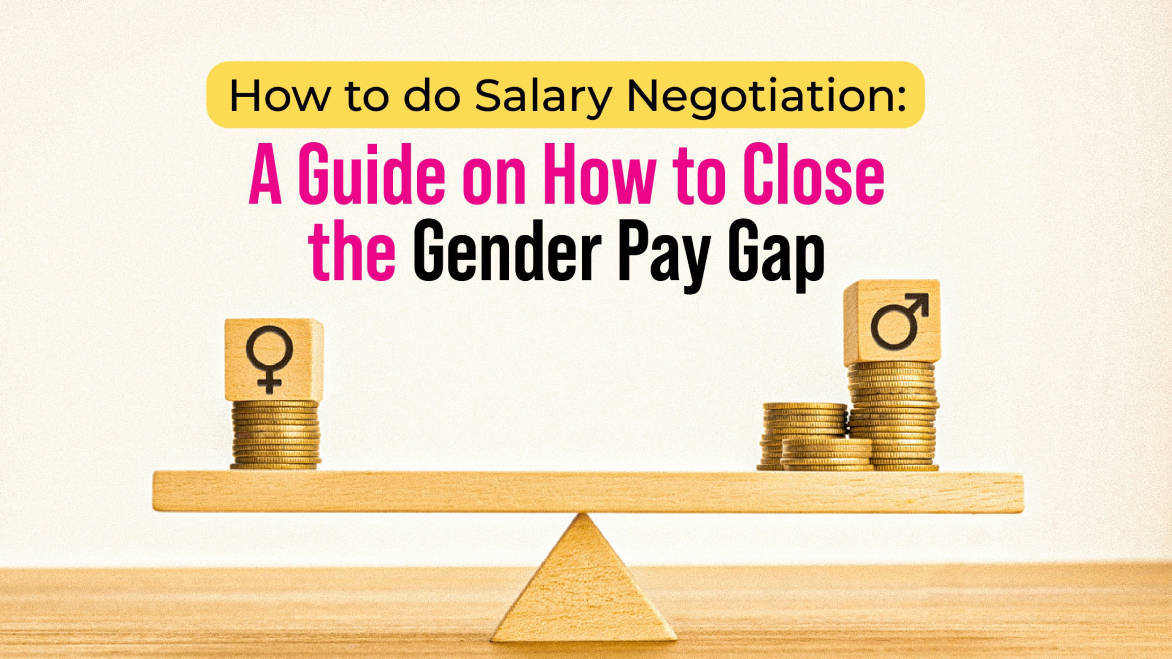Introduction
In today’s striving-for-equality workforce, mastering the art of salary negotiation is a powerful way to bridge the gender pay gap. Whether you’re seeking to secure a better salary or promotion, understanding the process is essential. This comprehensive guide will provide you with actionable tips and advice on how to do salary negotiation effectively, contributing to closing the gender pay gap and achieving equitable compensation.
-
Research and Preparation: Setting the Stage for Success
Before initiating any negotiation, thorough research is vital. Understand industry standards, company compensation trends, and market rates for your role. Armed with this information, you can confidently advocate for fair compensation.
-
Craft a Strong Pitch: Highlighting Your Value
Your pitch is your chance to shine. Clearly articulate your accomplishments, skills, and contributions to the organization. Use quantifiable achievements to showcase your impact and how you’ve gone above and beyond.
-
Timing Is Everything: Seize the Right Moment
Choose the right time to initiate negotiations. Performance reviews or the completion of a successful project can be opportune moments. Align your timing with moments that showcase your value to the company.
-
Practice Effective Communication: Articulate Your Case
Effective communication is key. Craft your negotiation script, focusing on how your skills align with company goals and how your contributions have positively impacted the team’s success.
-
Be Mindful of Non-Salary Perks: A Comprehensive Package
Salary isn’t the only factor to consider. Discuss additional benefits such as flexible hours, remote work options, professional development opportunities, and healthcare benefits. These can greatly enhance your overall compensation.
-
Stay Professional and Positive: Maintaining a Constructive Tone
Keep the negotiation conversation professional and positive. Emphasize your enthusiasm for your role and the company. A collaborative approach often yields better results.
-
Listen and Respond: Addressing Concerns
During negotiations, actively listen to the other party’s concerns. Address objections thoughtfully, using evidence and data to counter them. Be open to compromise while still standing firm on your value.
-
Leverage Market Research: Know Your Worth
Mention industry benchmarks and market data to support your negotiation. Demonstrating that you’re well-informed adds credibility to your case.
-
Practice, Practice, Practice: Role-Playing for Success
Practice with a friend or mentor to simulate negotiation scenarios. This helps you refine your arguments, gain confidence, and anticipate potential counterarguments.
-
Reflect and Celebrate: Regardless of the Outcome
After the negotiation, reflect on your efforts, regardless of the result. Acknowledge your courage and growth in initiating the conversation. Celebrate your progress, and remember that every negotiation is a learning experience.
Mastering the process of salary negotiation is a skill that can help close the gender pay gap and promote equity in the workplace. By following this step-by-step guide, you’ll be well-prepared to initiate productive negotiations, secure fair compensation, and contribute to a more inclusive and balanced work environment. Remember, knowing how to do a salary negotiation effectively is not only beneficial for you but also for the larger goal of achieving gender pay equality.
Related :- Wealth Personality Test: Customizing Debt Payoff Strategies
FAQs : Frequently Asked Questions
How to negotiate salary as a female?
Negotiating salary is a crucial skill for anyone, regardless of gender. For women, it’s important to approach the negotiation with confidence and preparedness. Start by researching industry standards and the value of your skills and experience. Highlight your achievements and contributions during the conversation, focusing on the value you bring to the role. Avoid underselling yourself or downplaying your accomplishments.
Practice assertiveness and maintain a positive and professional tone throughout the discussion. Emphasize your commitment to the organization and your enthusiasm for the role. Remember that negotiating is a normal part of the hiring process, and your skills and qualifications deserve fair compensation. By advocating for yourself and being well-prepared, you can help ensure that your salary reflects your worth in the professional world.
How do you negotiate salary after being hired?
Negotiating your salary after being hired requires a strategic approach and clear communication. Begin by expressing gratitude for the job offer and the opportunity to contribute to the company.
Then, present well-researched reasons for why you believe your skills, experience, and market value warrant a higher compensation. Emphasize your achievements and unique contributions that align with the company’s goals. Be open to a constructive conversation and willing to compromise, focusing on a win-win outcome. Remember to maintain professionalism, confidence, and a positive attitude throughout the negotiation process.
How do you politely negotiate salary?
Polite salary negotiation involves a respectful and collaborative tone. Start by expressing appreciation for the offer and the opportunity. Then, highlight your enthusiasm for the role and your alignment with the company’s values. Cite relevant accomplishments and industry research to justify your request for a higher salary.
Phrase your points in a way that emphasizes mutual benefit, focusing on how your skills will contribute to the company’s success. Maintain open communication, active listening, and a willingness to find common ground, ensuring that the negotiation remains courteous and constructive.
What is the best way to close the gender pay gap?
Closing the gender pay gap requires a multi-faceted and systemic approach. Firstly, companies should ensure transparent and fair salary structures, conducting regular pay audits to identify and rectify any disparities. Additionally, promoting diversity in leadership and decision-making roles can help challenge biased practices.
Implementing family-friendly policies, such as paid parental leave and flexible work arrangements, can support women’s career progression. Educational initiatives and mentorship programs can empower women to negotiate salaries confidently. Societal change is also crucial, encouraging shifts in cultural norms and expectations around caregiving and work responsibilities. Ultimately, a combination of corporate commitment, policy changes, and societal shifts can contribute to meaningful progress in closing the gender pay gap.
Share this blog with your family and friends if you find it insightful!!
Download the Lxme app for more such content!












